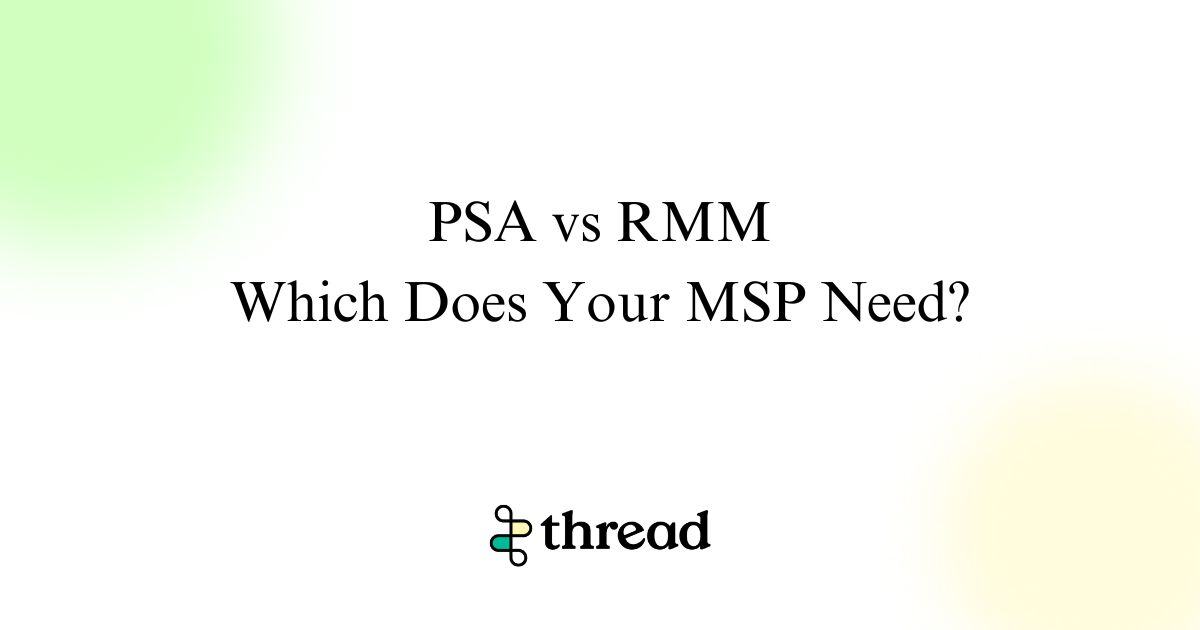Reactive vs Proactive Managed Services
Find out the key differences between reactive and proactive managed services and why working with a proactive MSP is the best solution for most...

Managed service providers commonly use cloud-based RMM and PSA software tools to perform and organize their work. These tools streamline different aspects of the MSP's workflow to increase efficiency and prevent technical issues or practical tasks like billing from falling through the cracks.
New MSPs may wonder if they can get away with using only one of these tools—or neither—or may plan to start with only one and add the other solution to their tech stack later on. A more in-depth understanding of the functions of each of these tools will help you work out which is needed more urgently in your MSP, why you really need both, and features to look for when choosing software solutions for your managed services business.
Remote monitoring and management (RMM) software functions as the eyes, hands, and feet of your MSP. It gives you full visibility over all of the endpoints your MSP services and allows you to monitor and manage them from a remote location rather than needing to travel to your clients’ premises in person.
Being able to monitor all of their clients' computers and systems remotely (and simultaneously) allows IT professionals to move from a break-fix model in which they are constantly putting out fires to a "fire prevention" model in which they can identify and fix issues before the client even realizes there's a problem.
The following are key tasks performed by an RMM solution:
While RMM software provides full technical visibility and allows technicians to troubleshoot computers remotely, PSA tools function as the "brain" of the MSP—taking care of the business processes that go into the day-to-day running of the company.
PSA software—as seen in the name—automates and centralizes professional service tasks, ranging from marketing and sales to customer service, accounting and billing, human resources, and more. While the RMM provides a centralized overview of how client networks and devices are performing, the PSA provides a centralized overview of how your business is performing and allows you to take care of your business operations and processes in a single place.
The functions a PSA performs include essentially all of the functions of enterprise resource planning (ERP) software plus client and ticket management. Here are some of the functions performed by a PSA broken down into categories.
MSPs need to both perform the work (RMM) and track the work (PSA), so you really need both. Foregoing either of these essential multitools means replacing the same functions with something else—either a wider range of single-use tools or a significant number of additional employees. Both of these approaches will generally cost you more than opting for a one-stop solution.
However, if you really must start with just one, ask yourself where you are losing the most money and time and work from there.
You should start with an RMM solution if:
You might be able to manage without an RMM tool if:
Conversely, PSA software might be the place to start if:
PSA tools might be a lower priority if:
Of course, one might wonder why either of these kinds of tools are needed. After all, didn't IT businesses work perfectly fine without them before? The main reasons these tools are now so essential are:
Investing in automation solutions like RMM and PSA tools—along with collaboration integrations like Thread—almost always has an excellent return on investment (ROI) compared to the amount you spend.
There are a few key features to look for in RMM and PSA tools (and also in any other tools you choose to add to your tech stack):
RMM and PSA software tools serve different but complementary functions. An RMM tool takes care of the technical details that are necessary for client success while a PSA tool takes care of the smooth running of the MSP business.
An MSP that is looking to scale needs both RMM and PSA tools as well as other solutions like firewalls, accounting software, and ideally collaboration tools like Thread. Make sure that the solutions you choose cover all the features you need, are user-friendly, and integrate across the board for streamlined and efficient service.
Find out the key differences between reactive and proactive managed services and why working with a proactive MSP is the best solution for most...
Find out the optimal IT staffing ratios that balance efficiency with cost and how IT solutions help MSP tech teams optimize their desk support.
Are you doing the bare minimum or showing your flair? Learn lessons from Office Space to drive your MSP business forward.
Sign up for our newsletter to get the latest and greatest delivered directly to your inbox by Aerosmith. just kidding, it's us, and the newsletter is awesome.